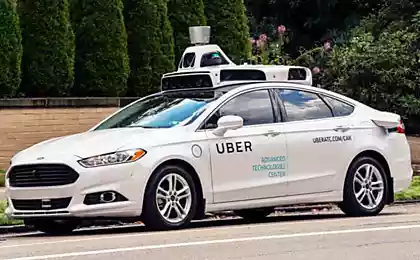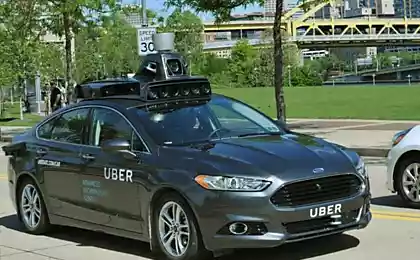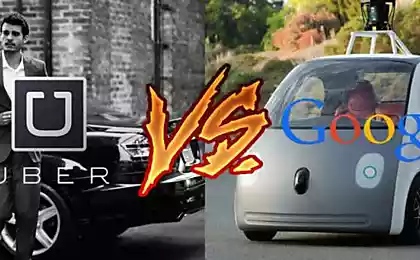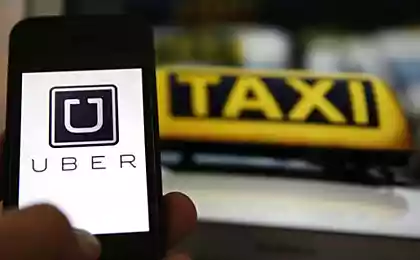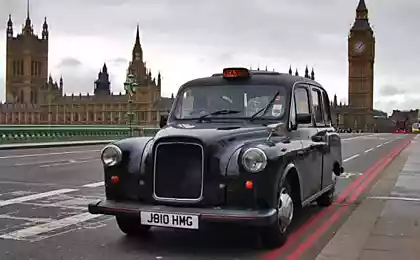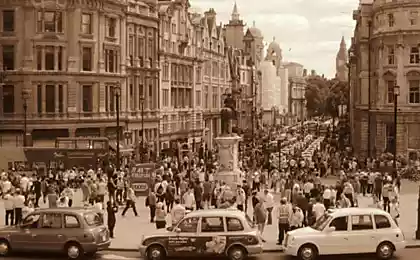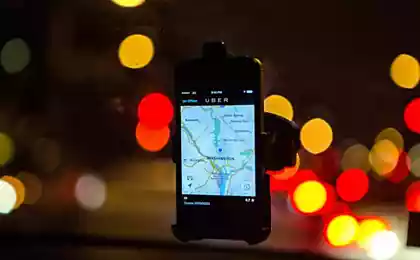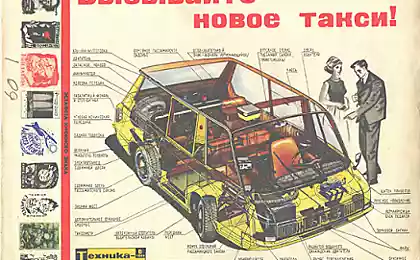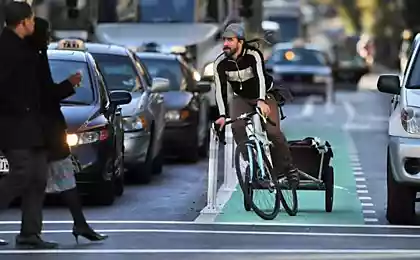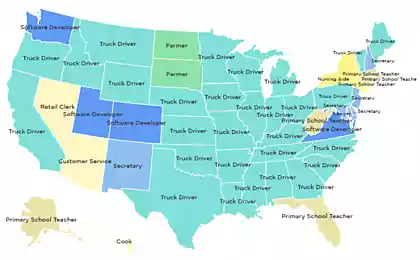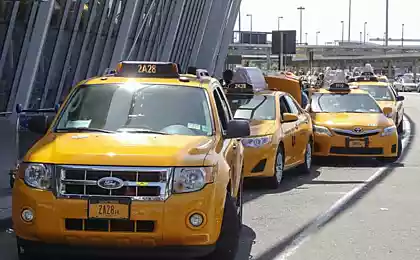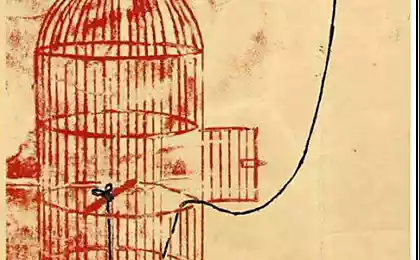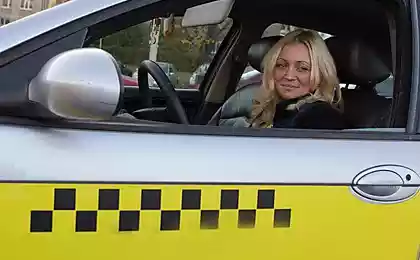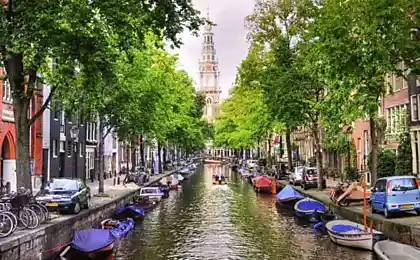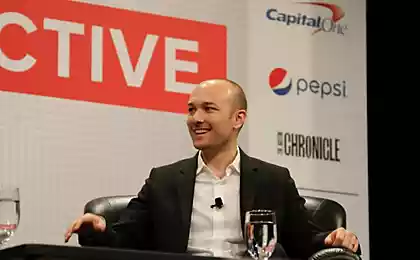503
The authorities do not know how to regulate the economy, based on equal partnership of citizens
Massachusetts introduces fee of $ 0, 05 with each call a taxi through a mobile application. The money will go the usual taxi drivers. This is a terrific example of how an innovative sector of the economy subject to a fee to subsidize loss-making competitors.
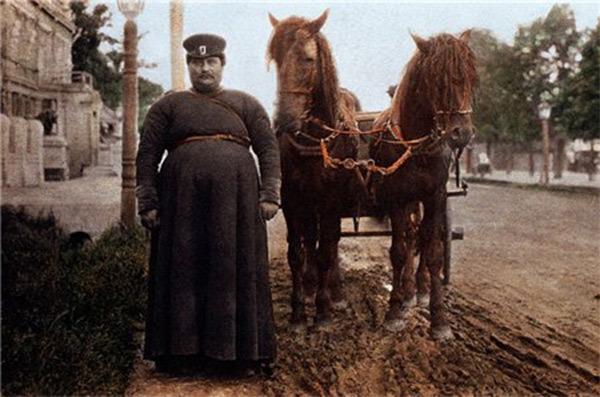
The driver in pre-revolutionary Russia
American Massachusetts introduces unprecedented steps to support the taxis, which can not compete with cheaper and more convenient service "computer Taxi" - call the car to the driver via the mobile app. Services like Uber, Lyft, Sidecar, «Yandeks.Taksi" and dozens like them work in many countries around the world and cause a massive disturbance of traditional taxis and taxi unions. Their business has developed over decades and can not change. For years, the taxi drivers waiting for a license to work - and received the coveted paper, felt secured to the end of life. Now, however, revolutionary changes threaten to leave them without a job.
Strikes and strike against Uber taxi drivers were held in the United States, France, Belgium, Belarus and other countries, in some countries, taxi drivers are attacked Uber drivers. Authorities often take the side of the traditional industry - and introduced a variety of measures regulating newfangled computer services taxi. Massachusetts authorities have gone along this path more than anyone whatsoever. In this state computer services taxis will be required to subsidize their less efficient competitors.
Massachusetts is preparing to introduce the collection of 5 cents on each trip through the computer service call for a taxi, and the money going to support the traditional taxi industry. This is the first case of such subsidies in the US and possibly worldwide.
Governor of the State signed a law on the introduction of the collection in August 2016 as part of a package of laws regulating the market. The decision has already been made, it remains only to develop a procedure for the collection of money from the IT-companies that operate in this sector.
The trade unions of taxi drivers wanted to go even further: they demanded to introduce mandatory licensing for private drivers, who find travel through the mobile application. They also required the use of a "private owners" of other regulatory measures that apply to professional taxi drivers, for example, regular inspection vehicle.
Taxi drivers are not required to enter the five-cent and 20-cent fee for each trip. It was assumed that from this money 5 cents will go to subsidies usual taxi, 10 cents - in the city budget, and another 5 cents to the state road fund
. Even a small gathering can bring millions of dollars. Only Uber and Lyft organize 2, 5 million visits per month in Massachusetts. This money will be spent on the implementation of "new technologies and advanced services, safety and operating features" ordinary taxi.
In other countries, the authorities also often listen to the taxi trade union demands and introduce regulatory measures to Uber and similar services. If you look at the problem in a broader sense, the legislators and regulators are trying to adapt to the "sharing economy" as a whole. The authorities can not figure out how to regulate this new economic model based on equal cooperation of citizens
Instead of giving such services maximum freedom and stimulate economic activity, the authorities are trying to apply the methods of regulation, which operated in the old economy. Drivers of private taxis are forced to obtain a license to issue insurance and taxi companies are forced to buy special tokens for each chauffeur. It is virtually impossible conditions for a private taxi. It is not surprising that in some countries the work of Uber and similar services generally prohibited or regulated by special rules. California Uber and Lyft classified as "transportation network company» (Transportation Network Companies, TNC) with the use of special control measures. All of these measures is hardly effective: ordinary taxi drivers still believe that their rights are infringed
. The unprecedented actions of the authorities in Massachusetts - is a special case. In fact, the authorities introduced a more efficient collection of innovative industry - and give the money less efficient industry obsolete taxis, because they alone are not able to compete
. This story reminds, how motorized road crews replaced coachmen on horseback, who were engaged in carting in the XIX and early XX century. It is the industry also strictly regulated by the state.
For all cabs were prescribed rules, which are applied for violation penalties:
The driver must have had his license plate number The license plate had to be nailed in the appropriate place. . Stop only in certain places. The crew had to be clean and unbroken. Kaftan cab should have been in decent form. < /in addition, they had to go to the police crew inspection, after which, if all goes well put certain seals. There were age restrictions: the driver had to be 18 to 65 years. It is also required that the driver "different sober behavior," but the latter requirement is not fulfilled everywhere.
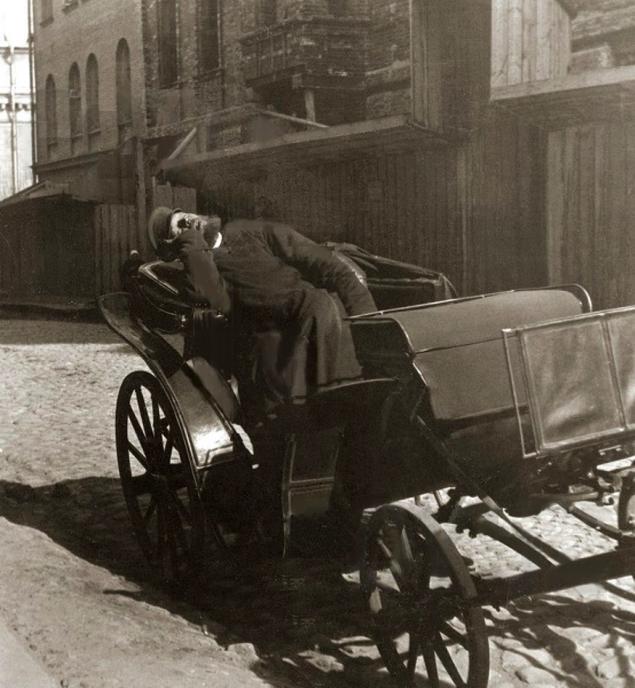
Waggoner on prolёtke (the customer expects). 1898
Interestingly, almost all pre-revolutionary rules for cabbies are now for the taxi drivers. But scientific progress does not stand still - and for the first two centuries cabs industry will have to put up with the changes
. Computer services like "Yandeks.Taksi" help find a companion to any driver who wants to pick up on the road man. He can do this once a week or once a month and is not engaged in professional taxi driver. Due to the large number of "random" drivers on the map there are always hundreds of available machines. The nearest of them will drive you on to GPS-coordinates for a few minutes and a ride costs will be much cheaper than a professional taxi. With regard to safety in the absence of government regulation, there should be no reason to worry: the organizers of the private carting already apply more stringent inspection rules than most taxis, including two-way evaluation system rating drivers. As a result, the drivers in the same Uber polite and well-dressed than the usual taxi companies, and their newer cars and better condition than regular taxis.
In such circumstances, the usual government regulation rules do not apply, and the authorities' attempts to introduce licensing or, especially, with each collection trip in favor of taxis look very ridiculous. The system perfectly adjusts itself without state participation, with which the authorities, apparently, is very difficult to accept.
However, the current revolution taksoservisov - it's flowers in comparison with what will begin when the commercial operation will be unmanned taxi
.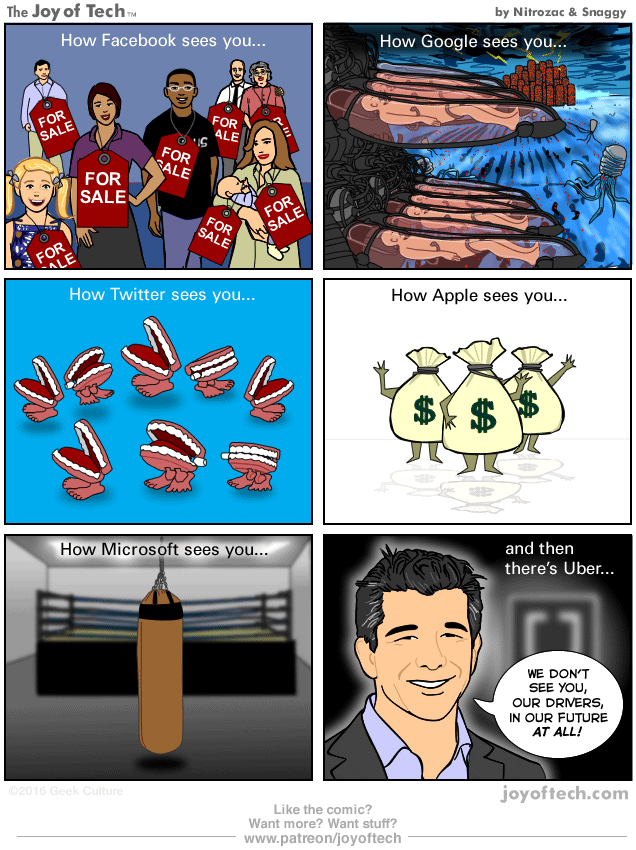
Illustration: Nitrozac & amp; Snaggy
I wonder how this taxi companies adapt?
Source: geektimes.ru/post/279678/

The driver in pre-revolutionary Russia
American Massachusetts introduces unprecedented steps to support the taxis, which can not compete with cheaper and more convenient service "computer Taxi" - call the car to the driver via the mobile app. Services like Uber, Lyft, Sidecar, «Yandeks.Taksi" and dozens like them work in many countries around the world and cause a massive disturbance of traditional taxis and taxi unions. Their business has developed over decades and can not change. For years, the taxi drivers waiting for a license to work - and received the coveted paper, felt secured to the end of life. Now, however, revolutionary changes threaten to leave them without a job.
Strikes and strike against Uber taxi drivers were held in the United States, France, Belgium, Belarus and other countries, in some countries, taxi drivers are attacked Uber drivers. Authorities often take the side of the traditional industry - and introduced a variety of measures regulating newfangled computer services taxi. Massachusetts authorities have gone along this path more than anyone whatsoever. In this state computer services taxis will be required to subsidize their less efficient competitors.
Massachusetts is preparing to introduce the collection of 5 cents on each trip through the computer service call for a taxi, and the money going to support the traditional taxi industry. This is the first case of such subsidies in the US and possibly worldwide.
Governor of the State signed a law on the introduction of the collection in August 2016 as part of a package of laws regulating the market. The decision has already been made, it remains only to develop a procedure for the collection of money from the IT-companies that operate in this sector.
The trade unions of taxi drivers wanted to go even further: they demanded to introduce mandatory licensing for private drivers, who find travel through the mobile application. They also required the use of a "private owners" of other regulatory measures that apply to professional taxi drivers, for example, regular inspection vehicle.
Taxi drivers are not required to enter the five-cent and 20-cent fee for each trip. It was assumed that from this money 5 cents will go to subsidies usual taxi, 10 cents - in the city budget, and another 5 cents to the state road fund
. Even a small gathering can bring millions of dollars. Only Uber and Lyft organize 2, 5 million visits per month in Massachusetts. This money will be spent on the implementation of "new technologies and advanced services, safety and operating features" ordinary taxi.
In other countries, the authorities also often listen to the taxi trade union demands and introduce regulatory measures to Uber and similar services. If you look at the problem in a broader sense, the legislators and regulators are trying to adapt to the "sharing economy" as a whole. The authorities can not figure out how to regulate this new economic model based on equal cooperation of citizens
Instead of giving such services maximum freedom and stimulate economic activity, the authorities are trying to apply the methods of regulation, which operated in the old economy. Drivers of private taxis are forced to obtain a license to issue insurance and taxi companies are forced to buy special tokens for each chauffeur. It is virtually impossible conditions for a private taxi. It is not surprising that in some countries the work of Uber and similar services generally prohibited or regulated by special rules. California Uber and Lyft classified as "transportation network company» (Transportation Network Companies, TNC) with the use of special control measures. All of these measures is hardly effective: ordinary taxi drivers still believe that their rights are infringed
. The unprecedented actions of the authorities in Massachusetts - is a special case. In fact, the authorities introduced a more efficient collection of innovative industry - and give the money less efficient industry obsolete taxis, because they alone are not able to compete
. This story reminds, how motorized road crews replaced coachmen on horseback, who were engaged in carting in the XIX and early XX century. It is the industry also strictly regulated by the state.
For all cabs were prescribed rules, which are applied for violation penalties:
The driver must have had his license plate number The license plate had to be nailed in the appropriate place. . Stop only in certain places. The crew had to be clean and unbroken. Kaftan cab should have been in decent form. < /in addition, they had to go to the police crew inspection, after which, if all goes well put certain seals. There were age restrictions: the driver had to be 18 to 65 years. It is also required that the driver "different sober behavior," but the latter requirement is not fulfilled everywhere.

Waggoner on prolёtke (the customer expects). 1898
Interestingly, almost all pre-revolutionary rules for cabbies are now for the taxi drivers. But scientific progress does not stand still - and for the first two centuries cabs industry will have to put up with the changes
. Computer services like "Yandeks.Taksi" help find a companion to any driver who wants to pick up on the road man. He can do this once a week or once a month and is not engaged in professional taxi driver. Due to the large number of "random" drivers on the map there are always hundreds of available machines. The nearest of them will drive you on to GPS-coordinates for a few minutes and a ride costs will be much cheaper than a professional taxi. With regard to safety in the absence of government regulation, there should be no reason to worry: the organizers of the private carting already apply more stringent inspection rules than most taxis, including two-way evaluation system rating drivers. As a result, the drivers in the same Uber polite and well-dressed than the usual taxi companies, and their newer cars and better condition than regular taxis.
In such circumstances, the usual government regulation rules do not apply, and the authorities' attempts to introduce licensing or, especially, with each collection trip in favor of taxis look very ridiculous. The system perfectly adjusts itself without state participation, with which the authorities, apparently, is very difficult to accept.
However, the current revolution taksoservisov - it's flowers in comparison with what will begin when the commercial operation will be unmanned taxi
.

Illustration: Nitrozac & amp; Snaggy
I wonder how this taxi companies adapt?
Source: geektimes.ru/post/279678/
In Switzerland, we made the robot, beat human table football
Free science. NASA's scientific work laid out in the open access
